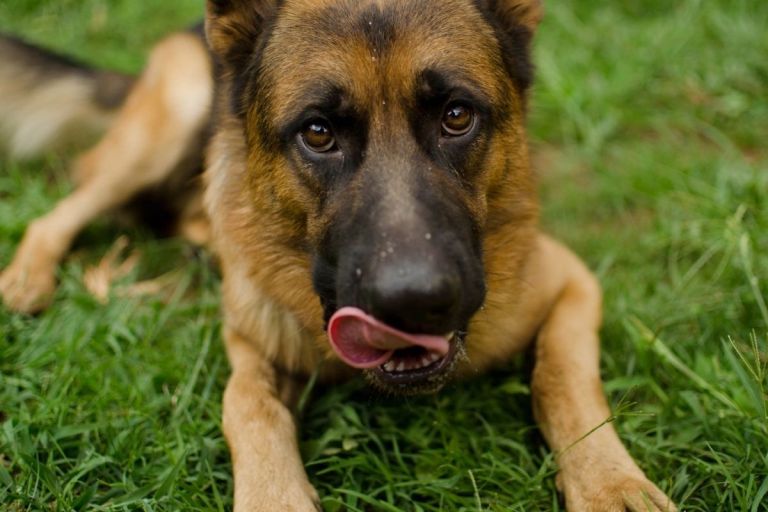German shepherds are wonderful dogs.
They’re big, strong, and intelligent. And their loyalty is unmatched.
But like any big, strong, intelligent animal, they can be frustrating at times.
Here’s what you need to know: there is a variety of dog behavior that German shepherds learn as they grow.
And if you want to address your dog’s whining and screaming, it will also be helpful to know that his behavior is not just about fun.
Your dog is exhibiting aggression and is feeling lonely.
You probably notice that he barks loudly, whines, and is excessively excited.
These behaviors are associated with separation anxiety, and German Shepherd puppy training goes a long way in these situations.
Training your dog to obey commands and to respond to stimulus can help him become happier and healthier, so avoid the urge to punish him for making a mistake.
Dogs are intelligent animals and can learn many things if you provide them with a good environment.
Why do German shepherds whine?
Contents
Your German Shepherd whines for a variety of reasons, including being in pain, feeling bored, wanting anything and seeking a playmate.
Scared
When a German Shepherd is afraid, they will often whimper.
Whining prevents a German Shepherd from making loud noises that might draw attention to themselves.
Whining prevents a German Shepherd from making loud noises that might draw attention to themselves.
It’s possible that your German shepherd is whimpering out of fear. Do not encourage your dog’s whining by giving him a treat while he’s complaining about anything.
If your dog is whimpering, ensure that he is safe and calm. Once he’s calmed down, you can speak to him in a gentle voice. When he feels calm and comfortable, he will likely stop whining.
Boredom
It might also be bored or lonely.
This is more probable if it whines more while engaged in an activity, such as walking, than while it’s resting.
German Shepherds are designed to be active dogs, so they need plenty of exercise to be happy.
If your German Shepherd does not receive an exercise routine sufficient to meet its needs, it may begin to whine and whimper until it gets whatever it needs.
Injured
It’s possible that your German Shepherd just thinks the whining is cute.
Whatever the reason, you should do your best to get your pup to the vet right away.
This is more probable if it just recently began suffering.
Your dog can also whine and whimper when its appetite is low. It can also do this if its food is not fresh.
It might, for example, have lately taken on a flea or tick that wasn’t removed properly. If your dog is whining, the first thing it needs is veterinary care.
Attention
If your German shepherd is whining continuously, then it’s time to start paying it more attention.
This is more probable if it usually doesn’t speak up and beg for attention.
Dogs are talented attention-grabbers, and they use their loud barking and white pupils when they want your attention so they can get a snack, a walk, or their favorite activity.
It’s also more probable if you allow it to run off leash.
If the dog is fat, barking more than usual (especially if the dog has a high-pitched bark), or if it has wet or muddy feet, it’s possible that it’s sick. It’s also more probable if it’s female and in heat.
In this situation, it will have learned to whine excessively.
Saying Hello
When dogs see their owners coming home, they may start whimpering.
When compared to other whines, this whine can seem remarkably loud and disturbing, especially if your dog is whining a lot.
Although German shepherds are inherently warm and inviting, not all German shepherd pups will behave this way.
Some will be overly excited, while others will be shy and reserved. Their personalities will be shaped by their experiences and habits.
Hungry
Look no farther if your dog only begins whining when he is bored, tired, or feeling left out.
Whining has many benefits for your dog. It allows him to get the attention he wants and serves as a form of communication.
Wait till he has stopped whining before feeding him.
It’s up to you, the pet owner, to decide when your dog should eat.
If your dog whines, then it’s a sign that there’s something wrong with his meal. He can be hungry, bored, or in pain.
One of the biggest mistakes that pet owners make is feeding dogs before a Rover dog has eaten enough.
This can starve a dog, especially if there’s a painful condition or illness that is causing him to whimper.
A dog can choke if he hasn’t eaten enough.
How to Stop Your German Shepherd from Whining
If your German Shepherd is excessively whimpering, try the following: If this occurs after a correction or reprimand, make sure your dog knows that you’re trying to help.
This will make him less likely to whine, knowing you won’t punish him.
Instead of scolding him, try to figure what has caused this behavior.
When your dog does anything like whimper, you should speak in a calm and soothing tone of voice.
Most dogs also respond to physical touch. Rubbing their head and back will make him feel calm and relaxed.
Teach your dog to cope with loneliness and frustration.
Stress is a common trigger for whimpering; when your dog is anxious or stressed, he might start whimpering as a way to relieve stress.
When your dog is distressed, he might become over-protective of his territory and his family members.
In this case, you should encourage your dog to spend more time with other dogs, friends, or family.
This will help increase his confidence while not missing out on quality time with you.
Also Read: Do German Shepherds Whine A Lot?
Conclusion
Although German Shepherds are adorable, sometimes they can whine and bark excessively when they want something.
When your dog seems overly anxious or inconsolable, investigate what’s causing his behavior.
With the above-mentioned factors in mind, you should be able to identify the cause of your dog’s whining and take the necessary steps to change it.
When your dog whines, never be hostile or lash out at him. Whining, no matter how annoying, is a normal part of owning a dog.




